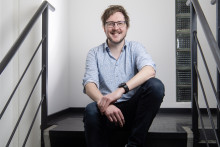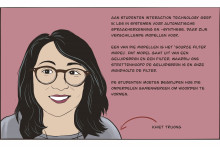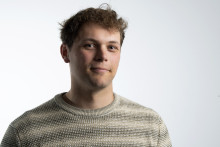Huub Lievestro
PhD research topic: Detox@home: remote monitoring and intervention during detoxification from addictive substances
Work: PhD candidate at the Human Media Interaction group, Faculty of Electrical Engineering, Mathematics and Computer Science (EEMCS) at the University of Twente
Education: Technical Medicine at the University of Twente
Originally from: Doetinchem, The Netherlands
‘Addiction is often misunderstood’, says Huub Lievestro. ‘People think you can simply stop drinking or taking drugs if you want to, but it is not that simple. I’ve talked to patients at a clinic, and they told me that they don’t enjoy what they do. They try to stop, but then the addiction kicks in and withdrawal symptoms force them to start again. Addiction is not about pleasure; it’s about fighting withdrawal symptoms. It’s a mental illness.’ And the PhD researcher is working on a solution to help patients cope with it.
Accessible and effective
In the Netherlands, about 10.000 patients are admitted to addiction clinics every year. To offer a more accessible alternative, Huub Lievestro is developing a clinical prototype that allows people to safely detox at home instead. He believes this will make detoxing more widely available, effective, and accepted.
‘As part of the Detox@Home project, I’m conducting research into remote monitoring and intervention during the detoxification of addictive substances’, says the PhD candidate. ‘Detoxing at home has many potential benefits. It is associated with less stigma; it provides a lower threshold for people because they don’t have to attend a ‘rehab’. They can keep working instead of taking a leave of absence, and their relatives can be more involved in the process. This way, the family can get a better understanding of what addiction is and what the person is struggling with.’
Ultimately, staying at home could also be more effective, adds Lievestro. ‘It allows people to learn how to cope with addiction in their own environment. In a clinic, there is no alcohol or drugs, there are no temptations, and there is a strict schedule with activities. However, then the patient walks out, goes to a supermarket, and is instantly confronted with shelves full of alcohol, for example.’
Clinical prototype
To make this process easier, the PhD researcher is developing a functional prototype that should make its way to the clinic within the next six years. ‘We are still interviewing patients and healthcare professionals to see what exactly the system should look like. However, in general, it should include a communication platform, to add more contact moments between the client and the practitioner. This way, you don’t have to always visit the patient to see how they are doing.’

Secondly, the system should include a ‘sense, think and act’ component, explains Lievestro. This involves sensors, such as heart rate and blood pressure sensors, to detect if the person is stressed, for example. The system can then suggest interventions, and possibly also notify the healthcare professional. It collects information and sends it to the dossier of the patient, so that the professional can review it and act on it.
Limited capacities
Going to a clinic is currently the most common option for people who need to detox. The details of the process depend on the substance the person is addicted to, but some patients require medication and medical attention. ‘If withdrawal symptoms are severe, the patient might even have an epileptic attack. In those cases, it’s of course good to be in a clinic with nurses that can assist you’, says Lievestro. If some patients can detox at home, the clinics can be reserved for the more serious cases.
This would help with another challenge that the Detox@Home project aims to solve: limited capacities in clinics. ‘Addiction care professionals told us that this system would reduce waiting lists, and it would allow them to help more people, use their time more effectively, and give more personalized treatment.’
'After talking to patients, I believe they would like to detox from home'
There is one group that could particularly benefit from detoxing at home. ‘As a sidetrack of this project, we are looking into detox for people with an intellectual disability’, says Lievestro. ‘People with such disabilities have certain limitations in cognitive functioning and skills, including language, social and self-care skills. Because of this, they often live with a mentor or in a communal home. For them, it is very invasive to be taken out of their own environment and put into a clinic, and so it might be better for them to detox at home. We are looking at what this specific group might need, and how we could support them.’
Prevention
Although the project is still at its beginning, reactions to the idea are positive, says the PhD candidate. ‘After talking to patients, I believe they would like to detox from home. It could help them to keep working, and it would help with prevention. For example, one patient told me that his urge to use drugs builds up – it keeps increasing, getting more intense, until he finally gives in. Having an easily accessible system could then help him to stop himself before he actually uses the drug.’
‘I really want to contribute to a functional system for the clinic’, says Huub Lievestro. ‘That is what I like about this project - that we are really developing a usable system. It is not just research. We are making something that will become a part of care, that doesn't just stay in a lab. That is the reason why I decided to do a PhD, even though I previously preferred to leave academia. I’m developing something that will be applied and help people.’
Detox@Home project
The Detox@Home project investigates how technology can be used to make detoxification in the home environment more widely accessible, more effective and less labour-intensive. This research is a collaboration between the University of Twente, Saxion, Radboud University Medical Center, Tactus Addiction Care, NISPA, Nedap, Menzis, Iriszorg, Novadic-Kentron, Intact, Stichting Het Zwarte Gat, and Mondriaan addiction care.









